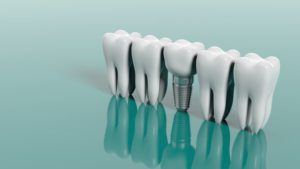 Your dentist has suggested that you get a dental implant to fill in the gap in your smile. It certainly sounds like a great solution – it’ll let you eat what you want, it’ll keep the jawbone strong, and you won’t have to worry about it slipping like you would with dentures. That said, you find that you’re still a bit nervous about having surgery done in your mouth; however, there’s no need to worry. Here’s what you need to know about getting dental implants in Buckhead.
Your dentist has suggested that you get a dental implant to fill in the gap in your smile. It certainly sounds like a great solution – it’ll let you eat what you want, it’ll keep the jawbone strong, and you won’t have to worry about it slipping like you would with dentures. That said, you find that you’re still a bit nervous about having surgery done in your mouth; however, there’s no need to worry. Here’s what you need to know about getting dental implants in Buckhead.
What Happens During the Dental Implant Process?
There are several preparatory steps you’ll need to take before the actual implant can be placed. For example, the dentist in Buckhead will need to take impressions of your mouth in order to create the crown that will act as the actual replacement tooth (the implant basically serves as tooth roots to hold it in place). You may also need an extraction if the tooth in question is still in your mouth.
Once everything’s ready, the implant will be surgically placed into the jawbone. This might require incisions in the gums, so stitches could be required afterwards. The insertion procedure will last about one or two hours; your jaw will then be given time to heal before you receive the permanent crown along with an abutment.
Will the Procedure Hurt?
Thanks to modern dental technology and techniques, most oral surgeries and procedures are a lot smoother and more painless than they used to be. Anesthesia will be used during dental implant surgery, so you’ll experience little to no discomfort. You might still feel vibrations or small amounts of pressure, however.
Of course, once the anesthesia wears off, you may need some form of pain medication such as ibuprofen; your dentist might prescribe you some along with antibiotics to avoid infection. You might also experience some swelling, but this can be controlled with an ice bag. Bleeding will be normal for the first 24 hours of recovery; call your dentist if it lasts longer.
What Else Can I Expect After the Procedure?
You’ll be limited to a liquid and soft food diet for a while. You’ll start with clear fluids like juice and lukewarm broth before slowly moving on to other foods such as applesauce and mashed potatoes; the key is to make sure you’re still maintaining good nutrition while giving the implant site the opportunity to heal.
Your dentist will have more specific aftercare instructions. Be sure to voice any questions or concerns you have before the procedure; it’s important that you know exactly what’s going to happen and why as well. Make sure you’re well-prepared before receiving your new teeth!
About the Author
Peter A. Pate is an active member of several dental groups, including the Georgia Dental Association. At his Atlanta practice, Dentistry in Buckhead, he holds patients comfort in high regard and helps everyone who walks through his doors feel welcomed. He’s happy to offer dental implants for those with missing teeth; to schedule an appointment, visit his website or call (404) 266-9424.
